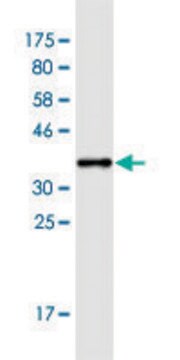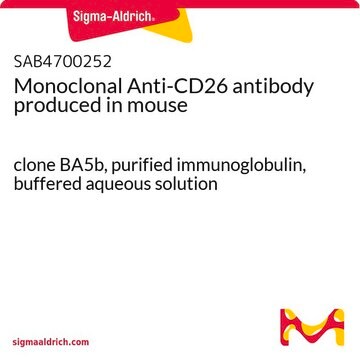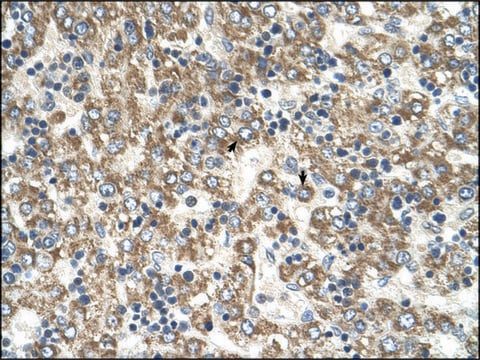MABS2291
Anti-DPP4/CD26 Antibody, clone KU44.13A
About This Item
Produits recommandés
Source biologique
mouse
Niveau de qualité
Conjugué
unconjugated
Forme d'anticorps
purified antibody
Type de produit anticorps
primary antibodies
Clone
KU44.13A, monoclonal
Poids mol.
calculated mol wt 88.28 kDa
Produit purifié par
using protein G
Espèces réactives
human
Conditionnement
antibody small pack of 100 μL
Technique(s)
ELISA: suitable
flow cytometry: suitable
immunofluorescence: suitable
immunohistochemistry (formalin-fixed, paraffin-embedded sections): suitable
immunoprecipitation (IP): suitable
Isotype
IgG2κ
Séquence de l'épitope
Extracellular domain
Numéro d'accès Protein ID
Numéro d'accès UniProt
Conditions d'expédition
2-8°C
Modification post-traductionnelle de la cible
unmodified
Catégories apparentées
Description générale
Spécificité
Immunogène
Application
Evaluated by Flow Cytometry in HPAF-II cells.
Flow Cytometry Analysis: 1 μg of this antibody detected DPP4/CD26 in one million HPAF-II cells.
Tested Applications
Immunofluorescence Analysis: A representative lot detected DPP4/CD26 in Immunofluorescence applications (Arias-Pinilla, G.A., et al. (2020). Sci Rep. 10(1):537).
Immunoprecipitation Analysis: A representative lot immunoprecipitated DPP4/CD26 in Immunoprecipitation applications (Arias-Pinilla, G.A., et al. (2020). Sci Rep.10(1):537).
ELISA Analysis: A representative lot detected DPP4/CD26 in ELISA applications (Arias-Pinilla, G.A., et al. (2020). Sci Rep. 10(1):537).
Flow Cytometry Analysis: A representative lot detected DPP4/CD26 in Flow Cytometry applications (Arias-Pinilla, G.A., et al. (2020). Sci Rep. 10(1):537).
Immunohistochemistry Applications: A representative lot detected DPP4/CD26 in Immunohistochemistry applications (Arias-Pinilla, G.A., et al. (2020). Sci Rep. 10(1):537).
Note: Actual optimal working dilutions must be determined by end user as specimens, and experimental conditions may vary with the end user
Forme physique
Stockage et stabilité
Autres remarques
Clause de non-responsabilité
Vous ne trouvez pas le bon produit ?
Essayez notre Outil de sélection de produits.
Code de la classe de stockage
12 - Non Combustible Liquids
Classe de danger pour l'eau (WGK)
WGK 1
Point d'éclair (°F)
Not applicable
Point d'éclair (°C)
Not applicable
Certificats d'analyse (COA)
Recherchez un Certificats d'analyse (COA) en saisissant le numéro de lot du produit. Les numéros de lot figurent sur l'étiquette du produit après les mots "Lot" ou "Batch".
Déjà en possession de ce produit ?
Retrouvez la documentation relative aux produits que vous avez récemment achetés dans la Bibliothèque de documents.
Notre équipe de scientifiques dispose d'une expérience dans tous les secteurs de la recherche, notamment en sciences de la vie, science des matériaux, synthèse chimique, chromatographie, analyse et dans de nombreux autres domaines..
Contacter notre Service technique








